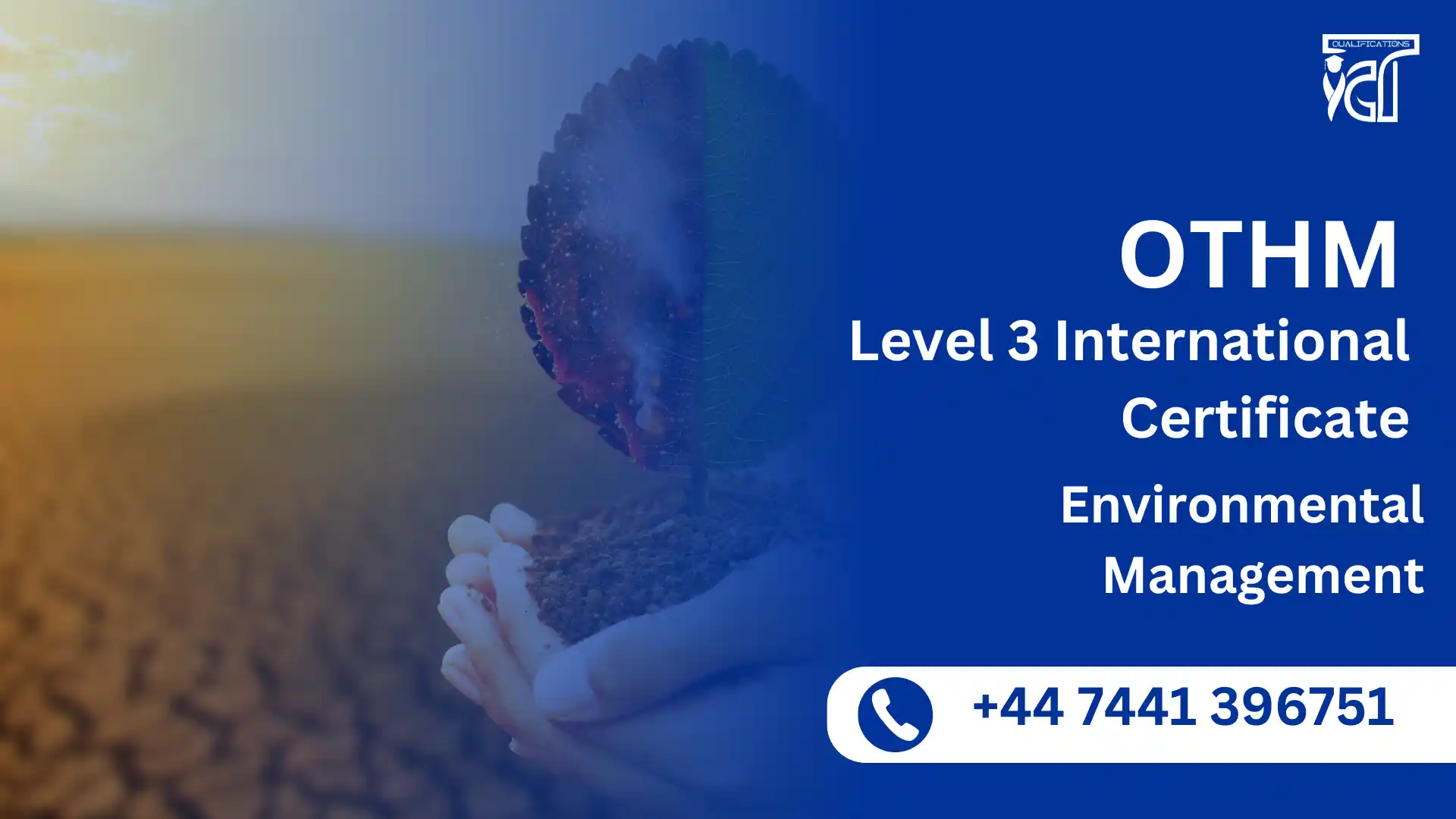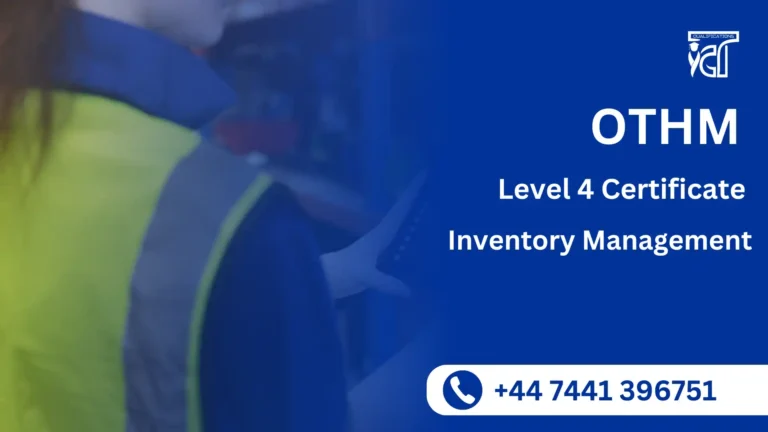As environmental issues become central to global policy and business practices, the demand for qualified professionals in environmental management continues to grow. Organizations across industries are seeking individuals who can help them reduce environmental impact, comply with legislation, and implement sustainable practices.
The OTHM Level 3 International Certificate in Environmental Management is a foundational, globally recognized qualification designed to equip learners with essential knowledge and practical skills in this critical field.
This program is regulated by Ofqual (The Office of Qualifications and Examinations Regulation) in the UK and is 100% assignment-based, making it accessible, flexible, and practical—ideal for both aspiring professionals and those already working in environmentally focused roles.
The OTHM Level 3 International Certificate in Environmental Management is a valuable starting point for anyone passionate about sustainability and environmental stewardship. With its flexible, assignment-based format and globally recognized status, it’s a smart choice for individuals and organizations investing in a greener future.
OTHM Level 3 International Certificate in Environmental Management
The OTHM Level 3 International Certificate in Environmental Management qualification consists of 6 mandatory units for a combined total of 36 credits and 180 Guided Learning Hours (GLH) for the completed qualification.
Mandatory units
| Sr# | Unit Title | Credits |
|---|---|---|
| 1 | Introduction to Environmental Management | 10 |
| 2 | Environmental Legislation and Regulation | 30 |
| 3 | Environmental Assessment and Audit | 20 |
| 4 | Implementation of Environmental Management Systems | 20 |
| 5 | Sustainability and Resource Management | 20 |
| 6 | Environmental Management in Practice | 20 |
GLH (Guided Learning Hours) and TQT (Total Qualification Time) are terms commonly used in vocational qualifications to help define the amount of time a learner is expected to spend on heir studies.
1. GLH (Guided Learning Hours)
GLH refers to the number of hours a learner spends being directly taught, supervised, or supported during their course. This includes the time spent in activities such as:
- Classroom instruction
- Practical workshops
- One-on-one tutoring or mentoring sessions
- Online learning sessions with tutor support
In other words, GLH represents the time that learners are actively engaged with their instructors or learning activities.
2. TQT (Total Qualification Time)
TQT represents the total amount of time a learner is expected to invest in completing a qualification, including:
- GLH (Guided Learning Hours): Time spent on direct learning, as explained above.
- Self-Directed Learning: This includes time spent on independent study, research, assignment completion, preparation for exams, and any other work the learner does outside of direct teaching hours.
TQT is a broader measure that includes all the time required to achieve the qualification. It helps learners and employers understand the overall commitment required for the qualification.
Key Differences Between GLH and TQT:
- GLH focuses on direct learning with guidance or supervision.
- TQT includes GLH as well as independent study time and other learning-related activities.
Example:
If a qualification has a TQT of 600 hours and a GLH of 250 hours, it means the learner should spend 250 hours in direct learning (classroom, online, or tutor-led sessions) and 350 hours on independent study or research.
Learning Outcomes of OTHM Level 3 International Certificate in Environmental Management
1. Introduction to Environmental Management
- Understand the scope and significance of environmental management in various sectors.
- Identify key environmental challenges, including pollution, climate change, and biodiversity loss.
- Explain the role of environmental management in supporting sustainable development goals (SDGs).
- Recognize the responsibilities of individuals and organizations in reducing environmental impacts.
- Describe basic tools and frameworks used in environmental monitoring and control.
2. Environmental Legislation and Regulation
- Understand the purpose and structure of environmental legislation at local, national, and international levels.
- Identify key legal obligations for businesses and individuals related to environmental protection.
- Explain the roles of regulatory bodies and enforcement agencies.
- Interpret commonly applied environmental regulations in industry, such as those related to emissions, waste management, and hazardous substances.
- Apply knowledge of regulations to promote legal compliance within an organizational setting.
3. Environmental Assessment and Audit
Upon completion of this unit, learners will be able to:
- Understand the principles and objectives of environmental impact assessment (EIA) and environmental audits.
- Identify steps involved in conducting an environmental assessment.
- Recognize the importance of stakeholder engagement in the assessment process.
- Evaluate environmental performance through audit methodologies and reporting.
- Apply assessment outcomes to support continuous improvement in environmental management.
4. Implementation of Environmental Management Systems (EMS)
Upon completion of this unit, learners will be able to:
- Understand the structure and purpose of environmental management systems, such as ISO 14001.
- Identify the key elements of an EMS, including policy, planning, implementation, monitoring, and review.
- Describe the benefits of EMS implementation for organizations and the environment.
- Support the development and maintenance of environmental documentation, records, and procedures.
- Assist in internal audits and contribute to EMS performance evaluations.
5. Sustainability and Resource Management
Upon completion of this unit, learners will be able to:
- Define sustainability and its three core pillars: environmental, social, and economic.
- Identify strategies for efficient resource use, including water, energy, and raw materials.
- Evaluate practices for waste reduction, recycling, and circular economy principles.
- Understand the impact of unsustainable practices on ecosystems and communities.
- Promote sustainable behaviors and initiatives within the workplace or community.
6. Environmental Management in Practice
Upon completion of this unit, learners will be able to:
- Apply foundational environmental management concepts in real-world settings.
- Identify and assess environmental risks in workplace operations.
- Support the implementation of workplace policies and initiatives to minimize environmental impact.
- Contribute to environmental awareness and training activities.
- Reflect on best practices and lessons learned to improve future environmental performance.
Course Benefitsof the OTHM Level 3 International Certificate in Environmental Management
- Foundational Knowledge in Environmental Management
Gain a solid understanding of key environmental concepts, issues, and best practices, essential for anyone looking to build a career in sustainability or environmental protection. - Globally Recognised Qualification
Achieve a UK-regulated certificate awarded by OTHM, recognised internationally, enhancing your credibility and career opportunities worldwide. - Career Advancement Opportunities
Open the door to roles in environmental consultancy, sustainability, waste management, and more—perfect for those entering the field or professionals seeking to upskill. - Pathway to Higher Education
This Level 3 qualification provides a strong foundation and progression route to higher-level courses in environmental science, management, or sustainability. - Boost Your Employability
Demonstrate to employers your commitment to environmental stewardship and your ability to understand and apply environmental policies and regulations. - Flexible Learning
Study at your own pace with the support of expert tutors, making it easy to balance education with work or personal commitments. - Real-World Application
Learn how to identify, assess, and manage environmental risks and develop strategies for sustainable development in real-life scenarios. - Supports Corporate Sustainability Goals
Ideal for employees in businesses seeking to align with environmental standards, reduce their ecological footprint, or comply with environmental laws.
The OTHM Level 3 International Certificate in Environmental Management is designed for individuals who are passionate about protecting the environment and are eager to play an active role in sustainable development. The ideal learner includes:
- Aspiring Environmental Professionals
Individuals looking to start a career in environmental management, sustainability, or conservation. - Students and School Leavers
Those who have recently completed secondary education and want a foundation-level qualification to pursue further studies or employment in the environmental sector. - Career Changers
Professionals from other industries who are interested in transitioning into the environmental field and need a solid introduction to the key principles and practices. - Entry-Level Employees
Staff working in roles related to health & safety, compliance, or operations who want to expand their knowledge and contribute to their organization
Entry Requirements
Register Now
Qualification Process
Qualification Process OTHM Level 3 International Certificate in Environmental Management
- Self-Assessment:
Begin by evaluating your eligibility to ensure you meet the qualification requirements, including work experience, knowledge, and language proficiency. - Registration:
Complete your registration by submitting the required documents, including a scanned copy of a valid ID, and paying the registration fee. - Induction:
An assessor will conduct an induction to confirm your eligibility for the course and explain the evidence requirements. If you do not meet the criteria, your registration will be canceled, and the fee will be refunded. - Assignments & Evidence Submission:
Provide all assignments and the necessary evidence based on the assessment criteria outlined in the course. If you are unsure of the required evidence, consult with the assessor for guidance on the type and nature of evidence needed. - Feedback and Revision:
The assessor will review your submitted evidence and provide feedback. Evidence that meets the criteria will be marked as “Criteria Met,” while any gaps will be identified. You will be asked to revise and resubmit if needed. - Competence Evidence:
Submit final evidence demonstrating that all learning outcomes have been met. This evidence will be marked as “Criteria Met” by the assessor once it is satisfactory. - Internal Quality Assurance (IQA):
The Internal Quality Assurance Verifier (IQA) will review your evidence to ensure consistency, quality, and compliance with standards. - External Verification:
The IQA will submit your portfolio to OTHM External Quality Assurance Versifier (EQA) for final confirmation. The EQA may contact you directly to verify the authenticity of your evidence. - Certification:
Upon successful completion of all checks, OTHM will issue your official certificate, confirming that you have attained the OTHM Level 3 International Certificate in Environmental Management







